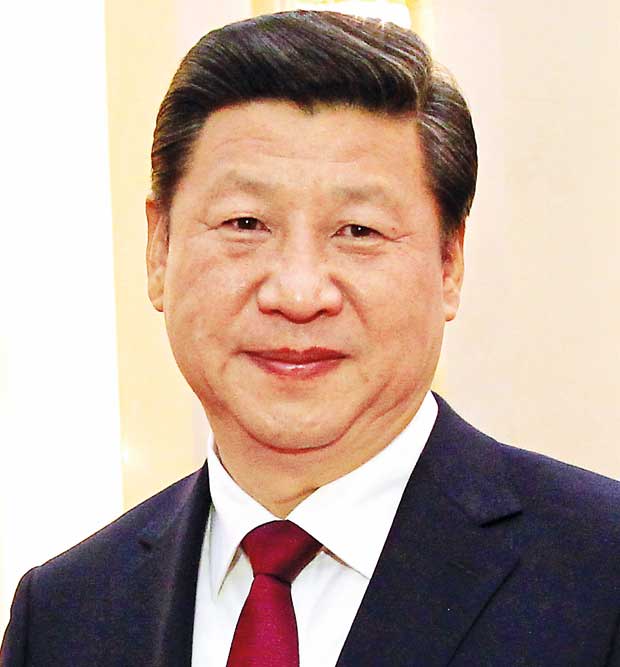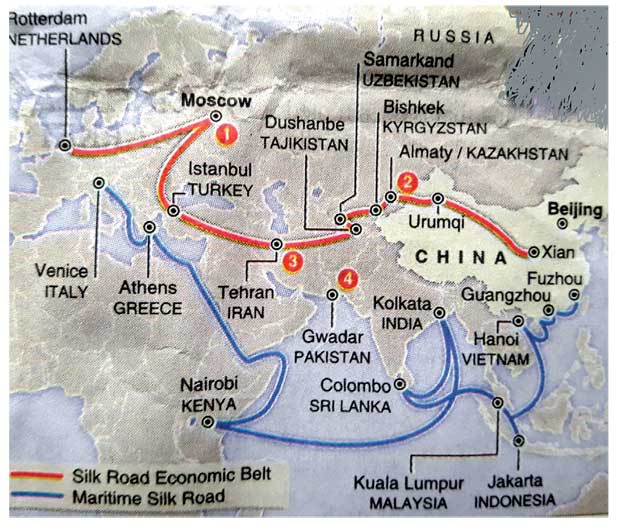Reply To:
Name - Reply Comment
Last Updated : 2024-04-20 00:00:00


History is the purveyor of the future. All great changes till they occur, remain fantasies and lunacies as Suez, Panama and Mahaveli were once. After they took place, they were considered oh so inevitable.
Karl Marx’s humanitarian heart beats in a tangible world. Others too, vended humanitarian products but delights in their consumption needed to be postponed, to be harvested in unseen and unseeable worlds. Marx wanted these humanitarian benefits to be relished in this world itself. “Workers of the world, unite, you have nothing to lose but your chains”, he hectored value generators of the world, who saw a disproportionate share of the surplus value created by their labours, transferred as profits to private owners of the instruments of production and exchange and rentiers of wealth assets. Marx predicted, one and a half centuries ago, that inequality would increase and a greater portion of the world’s assets would be owned by a smaller and smaller proportion of the world. He has been vindicated.
"Five hundred years of subservience to the West in different guises is part of Sri Lanka’s history. Post-independence offered the possibility of change: Sri Lankan rulers botched the opportunity"
Two globalisation eras created by private owners of wealth took place in the past 500-600 years. The first globalisation (Glob I) was through territorial expansion of almost every country in the European sub-continent (Italy, Spain, Portugal, France, Britain, Belgium, Holland, Denmark, Germany, Norway, Sweden and even the city state of Venice) which took place in a burst of imperial assertion. Glob I was labelled the British period and lasted from the 1700’s-1900’s. The second Globalisation (Glob II) was the discovery of America by Europe, which led to the eventual dominance of the world by the United States (USA). It would have been far better for the world if Plymouth Rock had fallen on the Pilgrim Fathers instead of the Pilgrim Fathers falling on Plymouth Rock. Glob II, labelled the American period, is supposed to last from 1900 to 2100. These British and American-induced globalisations were step-by-step, bottom-up processes, not drawing from an overall model, except to declare open season on Mother Nature, permitting her bounty to be converted to profits, irrespective of environmental consequences. Globs I and II worshipped crosses of sterling and dollars.
Both these periods of globalisation have now run their course, being sapped of energy and the world paying for their environmental depredations. The recently inaugurated OBOR by President Xi Jinping of China could be considered Globalisation III (Glob III), built on new principles and scaffolded with 21st century technology. It is a game changer. Glob III has come home, implementing Marx’s humanitarianism, through a Marxian political party-the Communist Party of China. Glob III is an inclusive, outward looking, top-down process, taking place at a time when Glob’s I and II of inward-looking Britain through Brexit and the US with Trump wishing a nativist America to be great again. President Xi scoffed at these reversions of Britain and the US as locking oneself in a dark room.
OBOR deals with the development of infrastructure public goods. These have long gestation periods which don’t appeal to the private sector. OBOR has two vertebral rows, one the maritime silk road, coursing down the South China Sea, cutting across the Malacca Straits into the Indian Ocean and proceeding to East Africa, eventually moving onward to Europe. The second is the Genghis Khan route, the land silk road originating from China, cutting through Central Asia and into Europe. The demand market of both routes is Europe, providing her goods and services, originating from the hinterland of a 65 Afro-Asian supply side.

To enable an unhindered supply of goods and services to Europe, public goods have to be produced in the hinterland, taking advantage of the economics of comparative advantage and delivery, benefiting from the infrastructure of roads, high-speed railways, canals, telecommunications, deep water ports, water supply, gas pipelines and airports. This hinterland of 65 countries has 60% of the world’s population and contributes to 1/3rd of the world’s economic output. The Asian Development Bank has calculated that to maintain growth, tackle poverty, fight climate change and serve the infrastructural needs of this hinterland, a continuous annual investment of US$1.7 trillion is required for ten years. OBOR investment is only US$1Trillion. To meet hinterland needs, there should at least be 15 more OBORs. It is said that OBOR is a new Marshall Plan. This is not fully valid. The Marshall Plan lasted four years and spent in today’s dollars, US$160 billion. The vision of the Marshall Plan was to rebuild Old Europe: the vision of OBOR is to provide hope for 60% of the world’s population, in a sustainable manner. Glob III is an interrelationship, facilitating the new globalisation. Glob III is making history before our eyes.
"Hambantota with its associated Mattala airport, would become a major competitor to Singapore’s air and seaports, the only economic assets Singapore has. Gawador, in Pakistan is a purpose-built warm water port in the Indian Ocean. It is terminus of the railway and road line starting 3,000 kilometres north, linking landlocked Sinjian in western and Central Asia. "
The Two Vertebral Rows (Crab Claws) of the One Belt One Road (OBOR) Initiative
In the 1400’s, China was an advanced civilisation under the Ming dynasty but a mysterious entity to the West, which was just recovering from its dark ages. During this period, China sent seven commercial expeditions to Asia by sea through the Malacca Straits under Admiral Zhang He, each reaching as far as the coast of East Africa. Each expedition was huge, composed of a fleet of 150 to 300 ships. The size of the Admiral’s flag ship, a nine-masted colossus 400 feet long, was not equalled until World War II. (For comparison, Columbus’ Santa Maria was 85 feet in length). The Admiral had 16 of these colossi. The flagship could easily have accommodated three of Vasco da Gama’s command ships within it. (On one of his return journeys, Admiral He made landfall in Ruhunu of Sri Lanka and white-vanned a king, abducting him to China.) Suddenly, for no particular reason, these Chinese expeditions ceased, leaving the Indian Ocean. European countries rushed in where China had refused to tread. Political economy, like nature, hates a vacuum. Eventually, the European countries outlived their welcome and by the 1950’s, Vasco da Gama’s successors made their way back home. Glob I was over, only its obsequies remain.
China is one of the longest continuous civilisations in the world. Apart from the last two or three centuries, China had one of the highest GDPs in the world. The last three centuries were a period of abject humiliation for China. European countries even compelled her to open her borders to import opium. On January 10, 1949, China gained her independence through battle. On this day on a podium on Tienanmen square, the Chairman of the Communist Party of China, Mao tse Tung, declared “China has stood up”. With its independence, China re-imagined the role State and determined what it should do both internally and in its relations with foreign countries. In 1949 her GDP per capita using 1990 constant dollars at PPP parity was $448, the lowest in the world. Thenceforth, it was a spectacular progress for China, one example being the humanistic elevation of 400 million Chinese from poverty, the greatest such advance in the history of humanity. Poverty is the most corrosive of polluters in the world.
" Sri Lanka gained her independence one and a half years prior to China, inheriting a higher economic base. She was the richest country in Asia next to Japan. While China stood up, Sri Lanka stood down. At the time of independence, her two main export crops were tea and rubber."
Sri Lanka gained her independence one and a half years prior to China, inheriting a higher economic base. She was the richest country in Asia next to Japan. While China stood up, Sri Lanka stood down. At the time of independence, her two main export crops were tea and rubber. Their surplus value, which was used to finance Sri Lanka’s commended free education and free health, was extracted from the fingers of heavily exploited young women. Sixty years after independence, her two highest earning foreign exchange earners have diversified but to housemaids and garment workers, the surplus value of both are continuing to be extracted through exploited young women. Sri Lanka refused to re-imagine the state taking advantage of her newly-acquired independence but only muttered about constitutional reform, document production as an alternative to development.
Sri Lanka’s democratically selected rulers drawn from all national parties in the post-independence period have failed the country.
Five hundred years of subservience to the West in different guises is part of Sri Lanka’s history. Post-independence offered the possibility of change: Sri Lankan rulers botched the opportunity. Her temporary colonial history seemed to have become her permanent destiny.
The OBOR initiative offers one more chance to Sri Lanka to take her history by the neck and make a difference to engage in unheard of levels of development.
As seen in the map, OBOR has two vertebral rows, the Southern and Central Asian arms. The Southern Arm of the OBOR initiative is the resurrection of Admiral Zhang He’s routes but there are significant alterations.
"Both these periods of globalisation have now run their course, being sapped of energy and the world paying for their environmental depredations. The recently inaugurated OBOR by President Xi Jinping of China could be considered Globalisation III (Glob III), built on new principles and scaffolded with 21st century technology"
Two deep water ports have been built-one in Hambantota, Sri Lanka and the other in Gwador, Pakistan. Hambantota with its associated Mattala airport, would become a major competitor to Singapore’s air and seaports, the only economic assets Singapore has. Gawador, in Pakistan is a purpose-built warm water port in the Indian Ocean. It is terminus of the railway and road line starting 3,000 kilometres north, linking landlocked Sinjian in western and Central Asia. Sinjian in China lies on the northern land silk route. This cross-link between land and maritime arms costing US$ 60billion, is named the Pakistan-China Economic Corridor (PCEC), although an alternative name may be the Indus Valley Economic Corridor (IVEC). The projects have such enormous potential that Sri Lanka would be most unwise not to take advantage of them to lever her economy. But to do so, Sri Lanka should be serious about it. As a matter of urgency, Sri Lanka should set up at least at State Ministry level, a dedicated full-time body as think tank to study all aspects of OBOR and make recommendations to the Cabinet.

Add comment
Comments will be edited (grammar, spelling and slang) and authorized at the discretion of Daily Mirror online. The website also has the right not to publish selected comments.
Reply To:
Name - Reply Comment
On March 26, a couple arriving from Thailand was arrested with 88 live animal
According to villagers from Naula-Moragolla out of 105 families 80 can afford
Is the situation in Sri Lanka so grim that locals harbour hope that they coul
A recent post on social media revealed that three purple-faced langurs near t